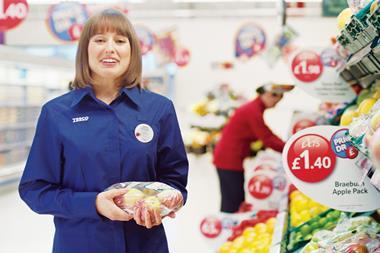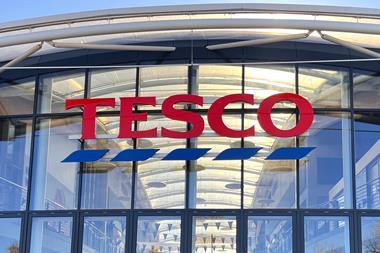Last September Tesco launched a baby and toddler catalogue as part of its mail order home shopping service. It was another strand of Tesco's stategy to provide a complete one stop shopping service covering every facet of the babycare products market.
The multiple has also made babycare an intrinsic part of its World Stores concept and in its 79 outlets with this designated status it is offering every kind of product, from clothing and nursery equipment to food and nappies, as well as services such as baby changing rooms, private breast feeding areas and crèches to make family shopping easier.
Tesco is far from alone in its strategy. Virtually all the major grocery retailers are treating babycare as a strategic category and are trying to provide as comprehensive a service as possible to meet the need for convenience of time poor/cash rich working mothers.
The babycare category is worth £1.2bn, has good margins, a high rate of sale and is the gateway to the massive family market.
"Mothers spend 50% more per basket than the average purchaser," points out Leigh Edwards, UK general sales manager of Heinz Farley's, the babyfood brand leader.
Safeway's inducements include mum-to-be-bags' with money-off coupons and product samples for expectant mothers, while its ABC cardholders get a 10% new baby discount off their total shopping bill for up to six months.
Instore facilities include fully equipped baby changing rooms, crèches and play areas in coffee shops. At fixture level, nappy shopping has been made easier by block merchandising by brand and siting them alongside wipes in many stores.
Winner of the Tommy Campaign's most parent friendly supermarket', Asda is at the leading edge of babycare category development. Baby marketing manager Alison Truman says the multiple is pursuing a one-stop shop policy: "Our aim is to provide everything customers want under one roof, from our George brand of baby clothing, to ease of shopping with our range of instore baby and child facilities.
"It is all about providing the convenience parents want."
With an expanded range, Truman says Asda's own label is tested by a panel of 220 mothers to ensure products meet their requirements. "We take their recommendations on board when we make improvements. It also enables us to reflect the trends that are coming through, such as providing the bigger nappy packs that mothers are asking for now."
Faced with such stiff competition, smaller retailers are increasingly being relegated to top up and distress shopping.
Budgens babycare category buyer Barry Carter says the chain's outlets are widely used for these kind of purchases, though stores in some locations are used for primary shopping.
"Within the limited 3m x 5m space available to the fixture, we stock the breadth, if not the depth, of the main brands in nappies, food and wipes.
"We concentate on range bestsellers and price competitively with the multiples."
Fierce competition for customer share has spawned a price/promotions battle primarily on disposable nappies over the last year.
Budgens' Carter says one leading nappy brand varied as much as £1 between the multiples late last year.
Asda's Truman says its Rollback campaign, which has been vigorously applied to leading brands Pampers and Huggies, as well as own label, has resulted in a substantial increase in its nappy market share.
"Latest FSA data shows our share has risen to 17.1% from 14.2% over the last year, overtaking Boots which has declined, putting us second after Tesco at 22.4%."
Truman says brand loyalty is high in this market and at its highest among first time mothers.
"They get reassurance from brands and perceive brands as best, but they are prepared to experiment with their subsequent offspring as they become more familiar with childcare. Both Pampers' Premiums with lotion and Huggies' new rash product are trading well."
Food promotions have also escalated, with three for two offers or equivalent price cutting becoming familiar, according to Heinz Farley's Edwards. "It's had a deflationary effect on value, while pushing up volume due to convenience purchasing. However, food isn't as sensitive to price as nappies.
"Brand availability is more important to mothers, particularly first timers," says Edwards.
Retailers are unanimous about organic babyfood being a main trend. Asda's Truman says sales are rising with every food scare. "Hipp Organic is doing very well."
Budgens began stocking Hipp Organic and Baby Organix in late autumn, says Carter.
"Early indications are that it is selling very well."
Heinz Farley's Edwards says organic babyfood is still very niche in terms of usage.
"Very few mothers are buying a totally organic diet for their children. They are using it as a treat, buying one or two organics along with four or five non organic to provide variety."
Heinz has no plans to move into organics at the moment, though it is "under review", adds Edwards.
The company's efforts are concentrated on growing consumption.
"Despite the birthrate decline, we see continued growth in formula milk because of convenience though combination feeding (breast/formula) which has become increasingly popular.
"In terms of solid food, research shows a baby's intake is split evenly between manufactured products and food made at home, so there's considerable opportunity to grow the market. We're also extending the upper age limit through our junior cuisine range."
Nestlé also sees potential in the toddler market where it recently launched one of the first UK branded ranges of biscuits, breadsticks and drinks for this age group.
The company hopes to emulate the success it achieved with the range in Germany where it has captured a third of the toddler market.
At the other end of the age spectrum, formula milk has been given a boost by SMA's recent launch of sachets containing pre-measured amounts of milk powder which address working mothers' pressing need for convenience.
Only parents of children born in the 1980s or earlier can truly appreciate the huge strides that have been made in product development over the last few years.
Tesco's baby and toddler catalogue, for example, features a tiny fingertip toothbrush massaging sore gums and cleaning first teeth, while Robinson has a forehead thermometer that produces a reading in 15 seconds without any fuss.
Wipes have revolutionised nappy-changing in and out of the home, making this sector one of the fastest growing in the last two years.
Kimberly-Clark has opened up a whole new market with its Huggies disposable absorbent training pants.
It is now trying to drive up usage of its potty training Pull-Ups through the launch last year of National Potty Training Week.
"Some 750,000 children go through potty training every year, but only one third use training pants," says marketing manager Vanessa Smith. Its Little Swimmers disposable swimming pants for toddlers have achieved "phenomenal volume growth" since launch in 1999, adds Smith.
Mothers' lives are being made much easier too.
Cannon Avent general manager John Morris says the company's manual Isis breast pump has helped extend the breast feeding period by extracting greater quantities of milk with minimum effort. "We've seen significant growth in demand for breast feeding aids since we launched Isis a year ago," says Morris.
Similarly, messy, time consuming chemical based bottle sterilisation equipment has been virtually replaced by steam sterilisation, according to Morris.
"We're now launching the fastest steam steriliser on the market which does the job in under nine minutes, sterilising six bottles at a time."
Convenience is clearly the key to growth in this market.
{{FOCUS SPECIALS }}
Close menu
- Home
- Retail & Wholesale
-
Products & Suppliers
- Back to parent navigation item
- Products & Suppliers
-
Product Categories:
- Back to parent navigation item
- Product Categories:
- Alcoholic drinks
- Bakery
- Cereals & breakfast
- Cheese
- Chicken & poultry
- Chocolate
- Confectionery
- Crisps, nuts & snacks
- Dairy
- Fish
- Fresh produce
- Frozen
- Household
- Meat
- Own Label
- Sauces & condiments
- Seasonal
- Soft drinks
- Vaping
- Vegan & plant-based
- World foods
- Suppliers
- People
- Reports & Data
-
Topics A-Z
- Back to parent navigation item
- Topics A-Z
-
Popular topics:
- Back to parent navigation item
- Popular topics:
- Cost of living crisis
- Crime
- Deposit Return Schemes
- Finance
- Government & Regulation
- Health
- Inflation
- Loyalty
- Marketing
- Mergers & Acquisitions
- New Product Development
- Sourcing
- Supply chain
- Sustainability & environment
- Technology
- Ultra Processed Foods
- Vaping
- A-Z all topics
- Content by type:
- Events
- Ask iA (beta)
- Subscribe now
Sign in to comment on this article
Not logged in before? Register for FREE guest access today.
You will be able to:
- Read more stories
- Receive daily newsletters
- Comment on stories
Advert



















No comments yet